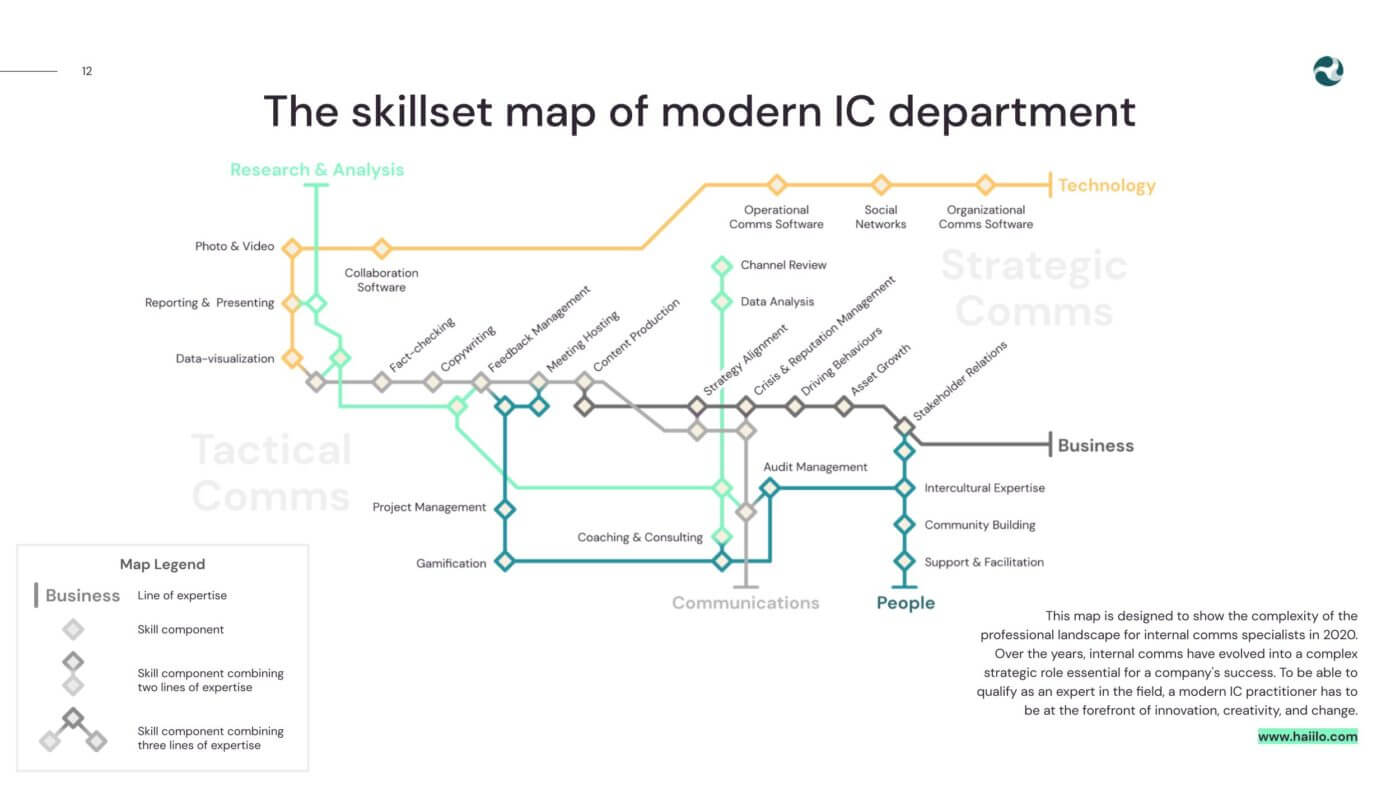Communication is the cornerstone of any organization’s success. It’s even more important in times of crisis.
Every company may at some point deal with an expected event that may have a direct impact on its brand image and reputation. If left unaddressed, this kind of situation can quickly get out of control and the workplace can become chaos.
📚Check out our Guide to the Empowering Leadership Style in the Workplace.
As an IC practitioner, you need to get prepared for it. While the corporate communications department will handle social media and public relations during the crisis, you’ll need to implement a communication plan for one of the organization’s most important audiences — your employees.
They will get confused, make assumptions, and they may even get worried about the negative effects the crisis may have on their jobs. They’ll come to you with lots of questions and you’ll have to be able to answer their questions right away.
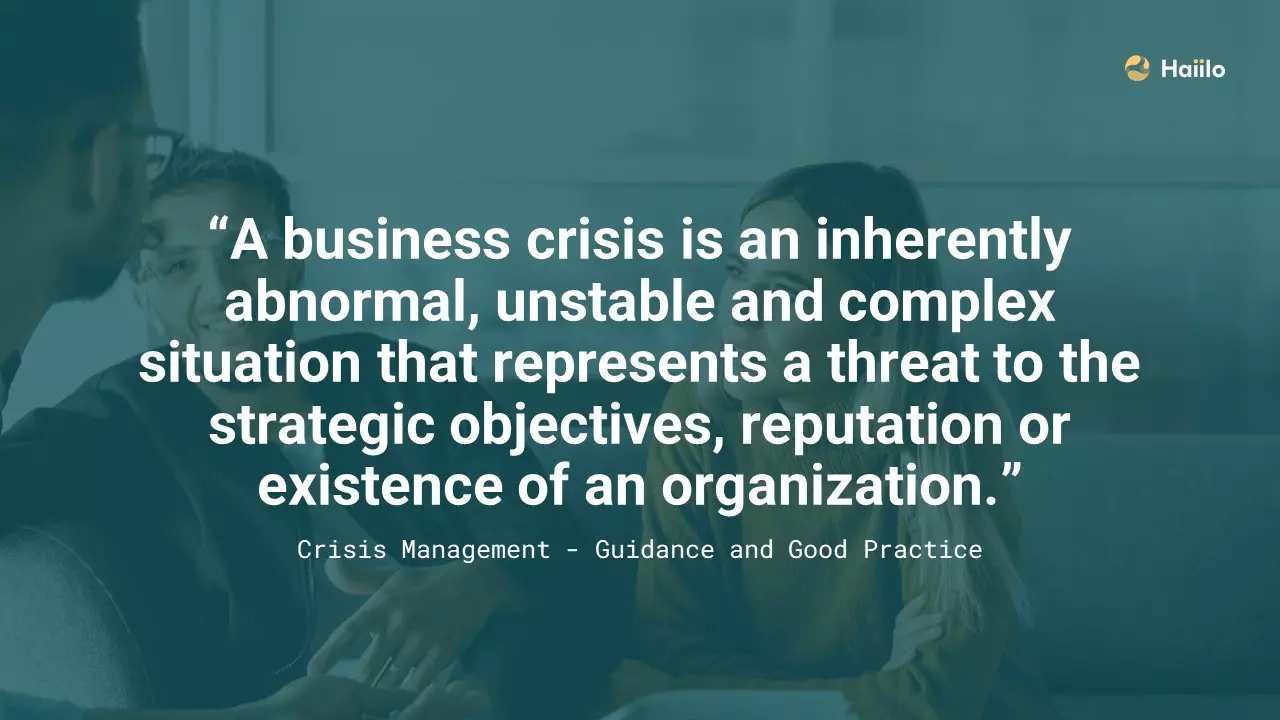
Think about it: when a crisis occurs, you can’t say to your employees “I understand your concerns but I don’t have more information at the moment, please be patient” or “I’ll get back to you later on this matter”.
Of course, you may not have the answers to all the questions, but you need to avoid the spread of misinformation across the organization before the workplace becomes chaos.
This is where crisis communication comes to place.
Your IC team plays a critical role in crisis management. To successfully handle business crises, your team needs to first understand what a business crisis is, how it starts, and how to implement a crisis communication plan within a short time frame.
Deliver the right information to the right people through their preferred channel of communication with a proper multi-channel comms tool
What Is a Business Crisis?
Any business, regardless of size, location, type, industry or sector may face a crisis that might threaten its financial or organizational stability.
A business crisis occurs when an unexpected event that may have negative effects on the company happens.
There are plenty of definitions for a business crisis but broadly speaking, a business crisis is an “inherently abnormal, unstable and complex situation that represents a threat to the strategic objectives, reputation or existence of an organization” (Crisis Management – Guidance and Good Practice).
Crises usually spread at a fast pace and require strategic management.
They may threaten the stability of the business and even its bottom line. Indeed, a crisis may impact the company’s image, reputation, financial health, regulatory compliance, and even its employees.
If not handled right away, the crisis can permanently damage the business or even cause it to fail.
To avoid such a situation, you’ll need to implement a successful crisis communication plan as soon as the crisis starts.
How Does the Coronavirus Outbreak Differ from Other Crises?
Most of the time, when businesses face a crisis, they either face a technological crisis, a natural crisis, a financial crisis, a personnel crisis, or an organizational crisis.
The thing is, the coronavirus is a global crisis.
It’s a public health crisis that has devastating consequences on people’s health and private life, global unemployment, healthcare systems, global supply chains, companies’ market values, technology, and international relations.
What’s more, the coronavirus crisis emerged unexpectedly and keeps spreading at a fast pace.
Governments are now launching emergency plans to overcome the crisis. Organizations have no choice but to rethink and redefine their internal processes, work arrangement policies, travel policies and guidelines, supply chain, and communications plans.
The Coronavirus Is Hurting the Global Economy
Let’s be clear: all industries are going to be somehow hit by the coronavirus crisis. As explained earlier, the pandemic is a global crisis and it’s going to impact directly or indirectly all industries.
Several business experts and analysts are already talking about a global recession. And Fortune magazine is pretty clear:
“The International Monetary Fund said it expects a global recession this year that will be at least as bad as the downturn during the financial crisis more than a decade ago, followed by a recovery in 2021”.
BBC released a few days ago a research on the growth forecasts for this year and the forecasts are not that great: while the global GPD growth rate was 2.8% last year, it is expected to be around 2.2-2.3% this year.
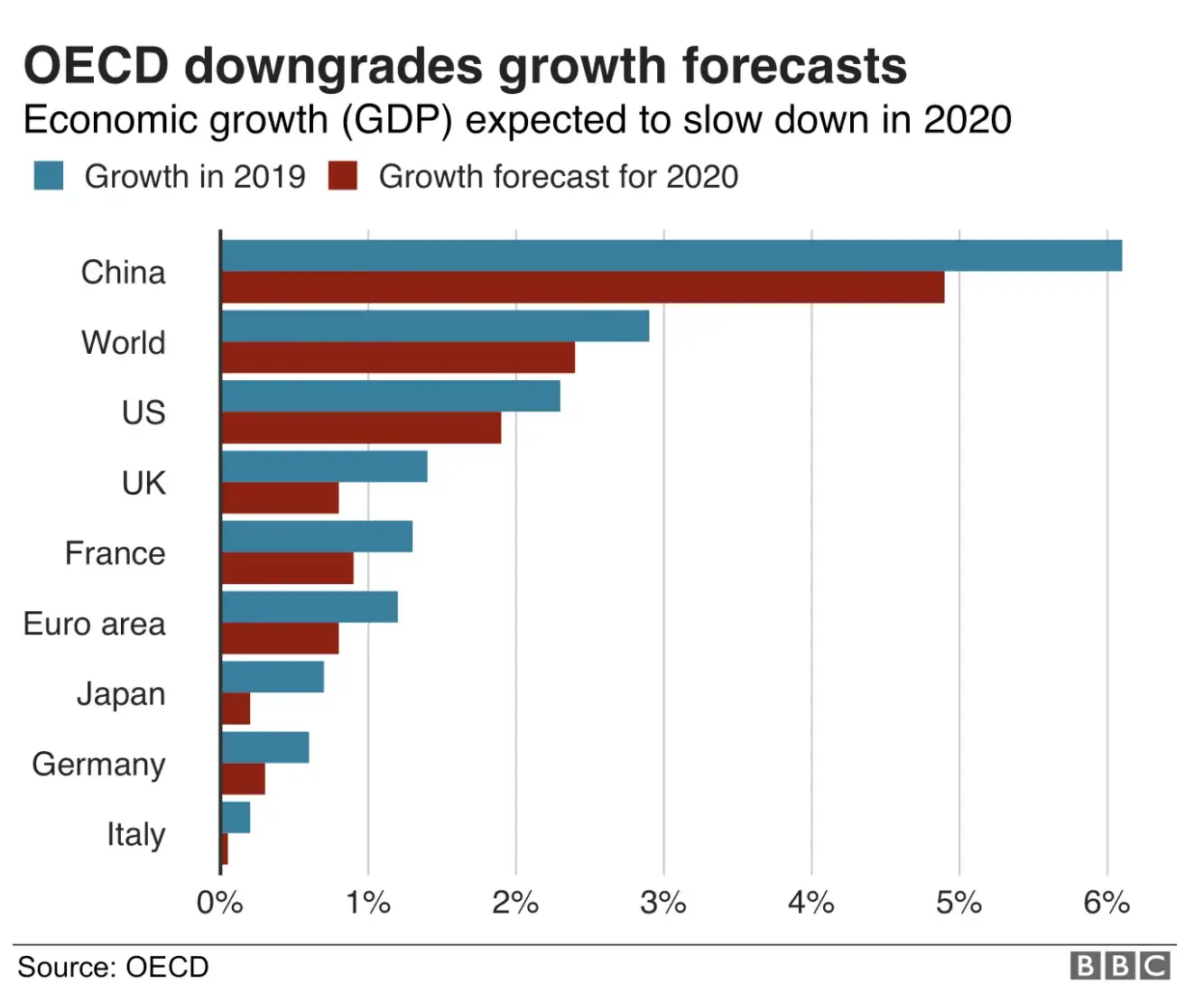
China’s GPD growth rate was above 6% last year and it’s expected to be under 5% at the end of 2020. While the US’s GPD growth rate was 2.1% last year, it is expected to be around 1.8-1.9% this year and while the Gross Domestic Product of France grew 1.3% in 2019, it is expected to grow 0.8% this year.
Industries Hit the Hardest by the Coronavirus Pandemic
The U.S. Private Sector Job Quality Index estimates that some 37 million domestic jobs are vulnerable to layoffs due the temporary shutdowns created by the viral outbreak.
So, what industries are the most vulnerable?
So far now, the hospitality industry — which includes the food and beverage sector, travel and tourism, lodging and accommodation, and the entertainment industry — seems to be the the industry with the highest amount of layoffs due to the coronavirus crisis.
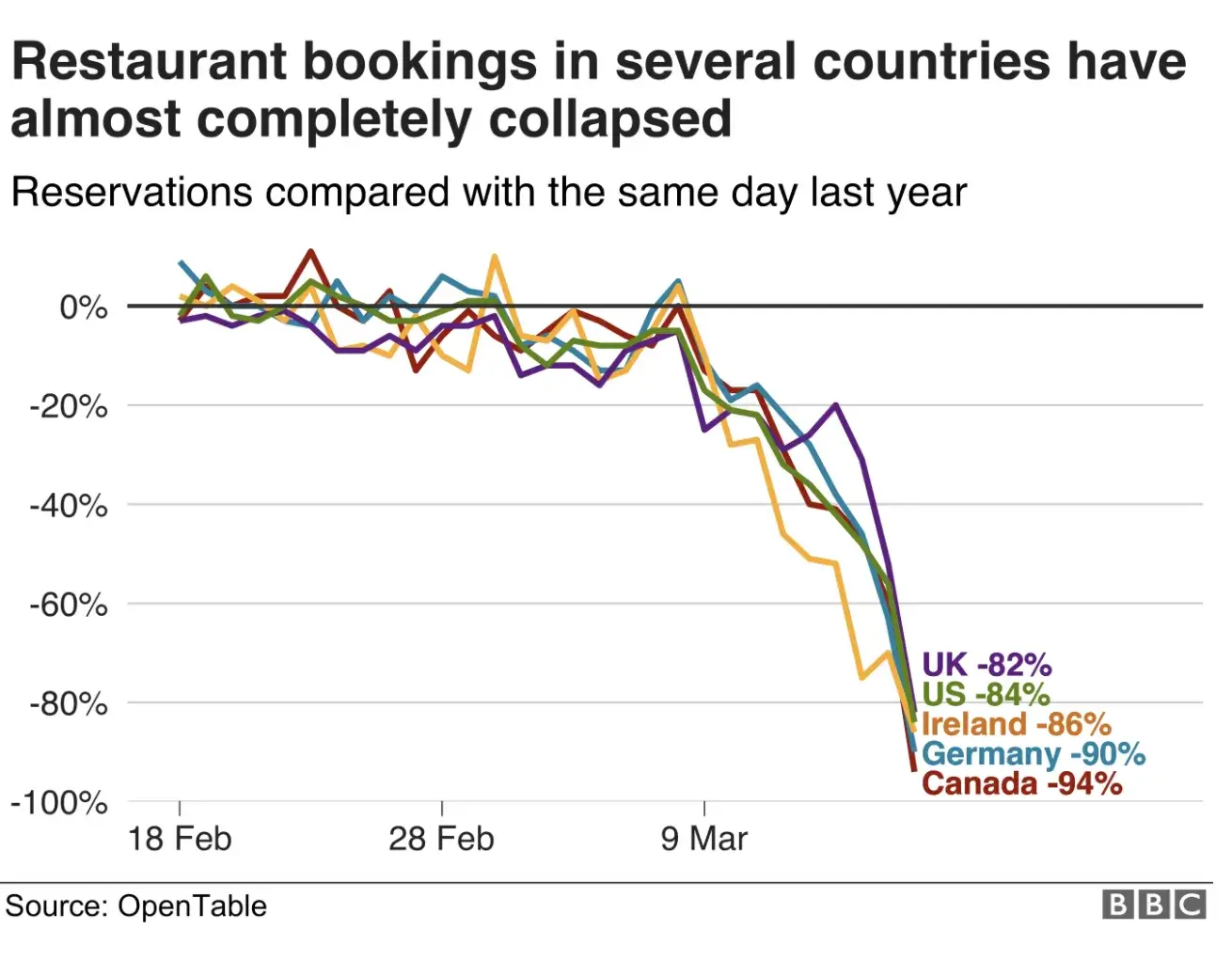
Worldwide, thousands of people working in this industry are projected to loose their jobs because of a lack of restaurant, accommodation and flight reservations due to the the COVID-19 crisis. According to the Economic Policy Institute, about 3 million jobs will be lost by summertime because of the coronavirus pandemic.
The Importance of Communicating with Employees During a Crisis
When a crisis occurs, top-level managers often tend to focus their communication efforts on their external audiences — including journalists and customers — and it’s understandable.
Think about it: when journalists start writing articles about THE crisis your company is facing, the incident that generated the crisis can snowball into a reputation crisis before you know it.
What will investors think about the company? Will customers stop advocating for the brand while they liked it so much before the crisis occurred? And what about the competitors — will they manage to take advantage of the situation?
Related: 11 Reasons Why Business Communication is Critical to Your Company’s Success
Handling media is necessary when it comes to crisis management, especially in the era of social media we’re living in.
But most of the time, top management overlooks the importance of communicating with employees.
This leads to two main problems:
1. Employees get confused and worried.
2. Employees may spread misinformation outside the company without knowing it.
Lack of Communication During a Crisis Leads to Confusion and Frustration in the Workplace
When a corporate crisis occurs, the workplace can quickly become chaos.
Without an adequate crisis communication plan in place, crises lead to confusion, misunderstandings, assumptions, rumors, and worries.
Employees don’t understand what’s going on. They have different understandings of the situation, they aren’t sure who they can talk to, and they don’t know what they can do to help. They start calling or messaging their colleagues to try to get some information about the crisis.
Employees also start sharing what they know so far about the crisis, even though the information is inaccurate. This is how rumors start to spread across the organization.
The work atmosphere becomes negative and employee productivity starts slowing down because everybody is trying to find information related to the crisis — either to know more about the origins of the crisis or to anticipate the effects the crisis may have on their jobs — instead of actually doing their jobs.
So, what does that mean for your organization?
When it comes to crisis management, information is the key.
Not only does crisis communication helps you avoid the spread of misinformation across the organization, but it also helps you ensuring continuous productivity.
People — including your employees — want to know what’s going on during a crisis. They want facts and the truth.
Related: What Is the True Cost of Poor Employee Communication?
In times of crisis, your employees need to be informed, reassured and listened to.
If you don’t provide them with the information they need during the crisis, they’ll find ways to get the information they want by themselves.
But the information they’ll find may actually be rumors. That’s why communicating with your employees during a crisis is essential.
Keeping Employees Uninformed May Speed up the Spread of Misinformation Outside the Company
Social media is a great place where professionals meet and share best practices.
It’s a wonderful place to create new business opportunities and build a strong relationship with your customers. But it can also put your company in a full-on crisis mode.
Imagine you’re working at a 100-employee company. Most employees — if not all of them — have at least a LinkedIn, Facebook and/or Instagram account. Imagine now that you’re working at a 1,000 or 10,000-employee company facing a crisis. Employees start having discussions with their friends and peers about the crisis your business is dealing with.
“So, what happened?” “Well, I’m not sure but apparently, the car had a mechanical failure and became dangerous for users”. “I see. I’ve heard that the company is going to launch a recall plan”. “Really? I was not aware of that. Let me reach out to some of my colleagues, they may know more about the situation. I’ll keep up updated”.
You can easily imagine how fast an incident or a mistake can end up in a full-on crisis. And if you’re in charge of communications in such a situation, your job can become a real nightmare!
No matter the origin of the crisis or how bad it is, employees will talk about it on social media. You’ll need to get them prepared so they don’t spread misinformation and panic outside the company.
With a clear crisis communication plan in place, you can even turn social media into a great opportunity to reinforce your company’s brand image and reputation in bad times.
As Shel Holtz, Director of Internal Communications at Webcor, said:
“Employees are increasingly important voices during crises. Thanks to social media, what an employee says is heard by a lot of people” .
Think about it: the Edelman Trust Barometer found that employees are more trustworthy than chief executives when it comes to communicating in a business context. And people tend to listen to employees even more often during a corporate crisis.
When a crisis occurs, people may have some doubts about messages shared by CEOs. Since the reputation and the financial health of the company are at risk, are they telling the truth or trying to sugarcoat the situation?
Instead of listening to the well-prepared messages coming from chief executives, people prefer to try to catch information coming from spokespeople who know the company’s products more than anyone else: employees.
So, if you effectively communicate with your employees during a crisis, you’ll considerably limit the risks of turning an internal incident into a corporate crisis everyone is talking about.
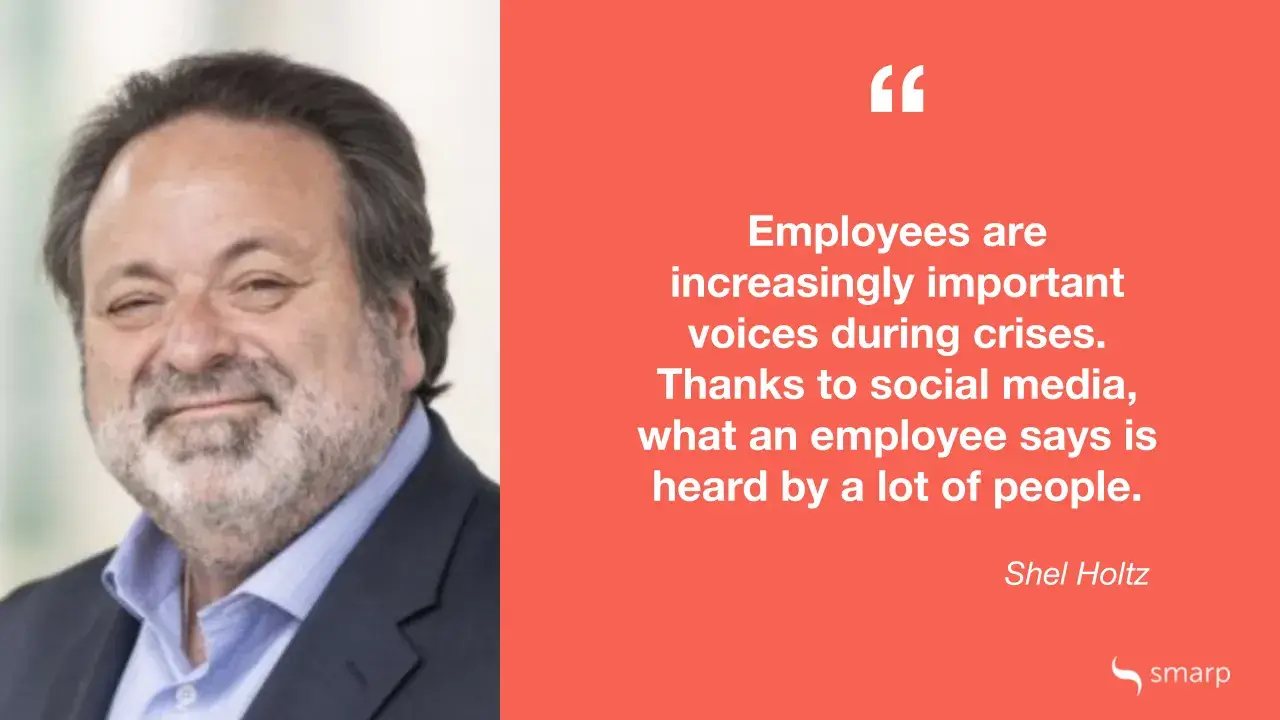
Word-of-mouth spreads at fast pace on social media. But it can either boost your brand image or damage it.
When it comes to addressing a corporate crisis, the key is transparency:
- Explain to your employees what happened, don’t let them guess.
- Tell the truth: explain the event that generated the crisis. Was it an accident that happened in the warehouse? If so, what actually happened — were the safety procedures followed? If not, why? Did the threat to warehouse safety get reported to the manager on time?
- Explain to your employees how their jobs but also the company image may be impacted.
- Share clear communication guidance when it comes to communicating outside the company.
Related: Your Employees Are Your Most Valuable Marketing Asset
If your employees have a great understanding of the situation and know what information they can share with their networks, they’ll be able to help protect the company’s reputation.
Put differently, well-informed employees are less likely to spread rumors on social media and turn the crisis into a full-on crisis that may permanently harm your business.
6 Crisis Communication Best Practices You Can’t Ignore
Communicating with employees is the key when it comes to addressing a corporate crisis.
But how to effectively build and deploy a crisis communication plan?
1. Be Prepared
As an IC practitioner, how do you react to a crisis happening at your company? Is your response going to be tactical or strategic?
You need to be prepared, even though your brand has a great reputation and financial health.
When it comes to corporate crises, the thing is, we never know when it’s going to happen. It’s one of the key characteristics of a business crisis: it happens suddenly.
The accident or mistake that generates the crisis was unexpected, unplanned. And when a crisis occurs, it doesn’t take long to escalate into a disaster.
That means you won’t have time to craft and build your crisis communication plan afterward.
Even though anticipating a crisis can be tricky — you don’t know when the crisis is going to happen or what event or accident may cause it — you need to prepare yourself for that.
Related: Top 5 Communication Skills and How to Improve Them
Simply put, a response to a crisis can be tactical or strategic. Depending on the nature of the crisis and the consequences it may have on your business, your response to the crisis can be either strategic, tactical, or both.
In a nutshell, a tactical response to a crisis is:
- Reactive
- Short-term focused
- Process-oriented
- Narrow-focused
- Focused on the implementation of a solution
While a strategic response to a crisis is:
- Based on anticipation
- Long-term focused
- Driven by your principles
- Wide-focused
- Based on your judgments
No matter what your response to the crisis will be, you’ll need to have a solid communication plan that your team can implement right away if something happens.
2. Build a Robust Crisis Communication Plan Even Though Your Company Hasn’t Faced One Yet
Preparing your IC team for a crisis doesn’t mean having an idea of the steps they’re going to follow if an unexpected event such as an accident or a mistake occurs.
Instead, it means having a clear and robust communication plan they can deploy immediately.
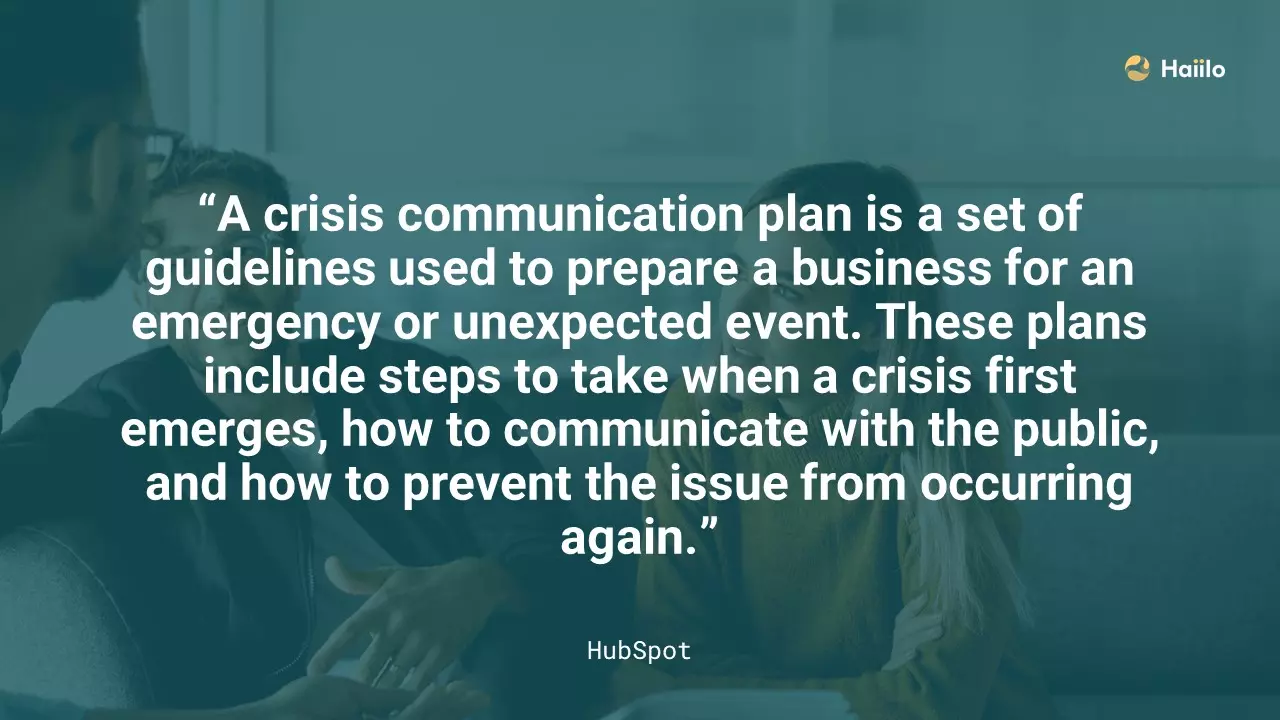
The key is to have a well-prepared communication plan you can implement as soon as an unexpected event threatening the business happens.
As Paul Barton, principal consultant at Paul Barton Communications in Phoenix said:
“We know that crises are inevitable. It’s not a question of if, but when a crisis will strike your organization. Every organization should have a crisis plan and every crisis plan should have an employee communication component”.
So, what is a crisis communication plan and how to craft one?
HubSpot defines a crisis communication plan as “a set of guidelines used to prepare a business for an emergency or unexpected event. These plans include steps to take when a crisis first emerges, how to communicate with the public, and how to prevent the issue from occurring again”.
To get your team all set, your crisis communication plan must include the following elements:
The goal of the plan
What do you want to achieve with your communication plan, what’s your #1 priority? Is it to clarify the situation? To reassure your employees, maintain continuous productivity in the workplace or gain your employee’s trust?
The list of the spokespeople involved in the communication plan
No matter what happens, your team needs to know who is involved in the communication plan, what their responsibilities are, and who’s the go-to-person employees can get in touch with to ask questions. That way, you avoid confusion and panic within your own team.
The information that should be communicated during and after the crisis
Your plan should include the information that should be communicated internally but externally as well.
Clear guidelines to create fact sheets and the list of people in charge of creating them
Fact sheets are lists of known facts about the crisis. They will help your team communicating the right information to the employees.
It’s a great way to avoid confusion and speculations in the workplace.
Several crisis scenarios
You’ll need to write different crisis scenarios for your team. It’s one of the best ways to anticipate the crises the organization may go through at some point.
Questions employees may ask
One of the best ways to prepare for a crisis is to anticipate the questions employees may have because when it happens, they’ll come to you with lots of questions.
If left unanswered, these questions may lead to rumors.
So, anticipate the questions your employees may have for each of the scenarios you’ve described in your crisis communication plan and prepare the answers to these questions as well.
Risks associated with the current crisis communication plan
What would happen if the communication plan is not solid enough or not well executed?
There are always pros and cons when it comes to crisis communication.
Even though you tried your best to prepare yourself and your employees, your communication plan won’t be perfect.
Indeed, all company crises happen in specific contexts, it’s unlikely that you’ll face the exact same crisis several times. So, when a new crisis happens, it’s not easy to make the right decisions.
Before making any important communication decision, think about the risks associated with these decisions.
3. Manage all your communication materials in one place
Poor communication leads to confusion in the workplace, especially when a crisis occurs.
“What happened?” “Who was in charge?” “How is the crisis going to affect our jobs?” “What shall we say to our peers who ask us questions about the event?” “What do we do if journalists reach out to some of us?” All these questions will be asked by your employees.
As mentioned earlier, timelines are critical in crisis management.
You need to manage your time and resources wisely so neither your team or employees feel overwhelmed with unclear messages going in different directions.
The key in crisis communication is to centralize your messages and your communication materials into one place. That way, you avoid duplicate content that may lead to information overload and frustration in the workplace.
Centralizing all the communication materials you’re going to use in crisis management into one place is also a great way to make sure that the right information reaches the right employees at the right time.
Using an employee communications platform such as Haiilo will help you segment your internal audiences and better coordinate your messages during a crisis. Book a demo here to learn how it works.
4. Don’t Wait — Start Discussions with Your Employees Right Away
As mentioned earlier, transparency is the key when it comes to addressing a corporate crisis.
If you don’t share the whole story or if you try to sugarcoat the accident, your employees will notice it right away!
One of the worst communication mistakes you can ever make is to try to keep the information in the communications department only.
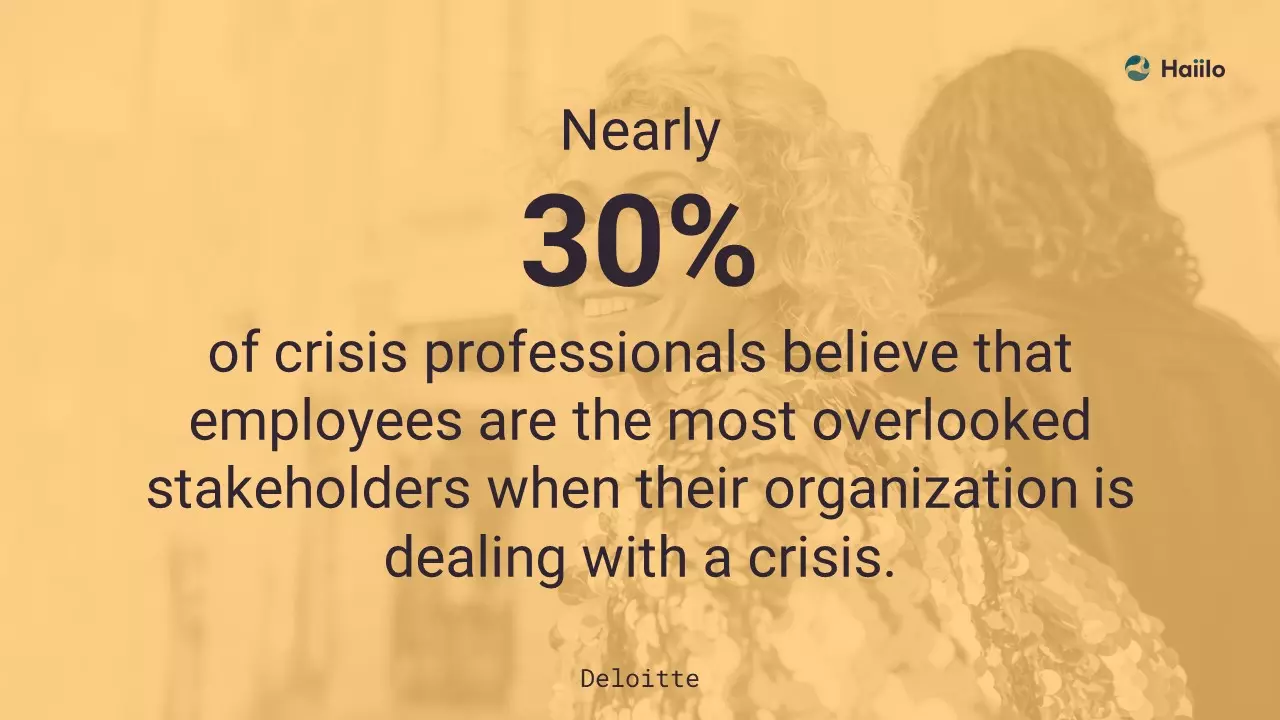
Information will start leaking anyway, whether it is accurate or not. And this is how rumors start to spread across the workplace and even outside the organization.
Instead, trust your employees and tell them the whole story. Explain to them how the crisis started, what event has caused it, how it may affect their daily jobs, and what your communication plan is.
Keep in mind that when a crisis occurs, you need to act fast.
Don’t wait for your employees to make assumptions about the event that has caused the crisis, who’s involved in the crisis, or the crisis itself.
Again, this is how rumors get started in the workplace, and they may harm your business before you know it.
Related: Internal Communications: the Shift Toward Two-Way Relationships
Building a transparent and open communication during a crisis is one of the best ways to get employees on your side and reinforce their trust.
5. Coordinate Your Crisis Communication Plan with the Corporate Communications Department
📣 Spoiler alert: internal and external communications are not two separate worlds!
Building a consistent communication plan is critical in crisis management.
And to do so, you need to make sure that the messages you share internally are consistent with the ones shared outside the organization, especially on social media.
If these messages are not aligned, you may create even more confusion among your employees!
One of the golden rules in crisis communication is to work hand-in-hand with the corporate communications department.
Related: 12 Reasons Why Internal & External Communications Go Hand-in-Hand
It’s the only way you can ensure that no confidential information leaks outside the organization and that your crisis communication strategy is robust enough to protect the company’s reputation.
6. Give Your Employees a Role in Crisis Communication
Even though employees play an essential role in crisis management, they tend to be overlooked in most businesses.
Think about it: nearly 30% of respondents to a Deloitte Advisory poll believe that employees are the most overlooked stakeholders when their organization is dealing with a crisis.
As Paul Barton said:
“In the rush and panic of a crisis, it’s easy to take employees for granted or maybe even forget them altogether. That’s a costly mistake because employees are probably going to be the single biggest determinant in how fast and how well an organization recovers from a crisis, and they’ll be the first contact with customers as recovery occurs. It is employees who represent the company’s brand to customers. And it is employees that get the work done”.
Not only well-prepared employees can help you overcome a crisis, but they also play a critical role in the recovery process.
And here’s how:
- Employees can help you run your business smoothly during the crisis by maintaining continuous productivity
- By sharing the right information with their colleagues, they can prevent rumors from spreading in the company
- Don’t forget that stress is contagious! Your employees’ attitude may either improve the situation or make it worse. By keeping calm during the crisis, they can prevent the spread of confusion and panic in the workplace.
- Whether your employees work in sales or customer support management, they are the ones having ongoing discussions with leads and clients. Depending on how well-prepared they are, they can either reassure clients and prospects or spread panic outside the organization.
- By sharing the right information with their personal networks, well-informed employees can play a significant role in protecting the company’s image and market capitalization.
So, when planning your crisis communication strategy, don’t forget to include your employees in it. They’ll help you keep the situation under control inside and outside the organization.
Give your employees a clear role in crisis communication and train them so they know how to communicate with both their colleagues and personal networks during a crisis.
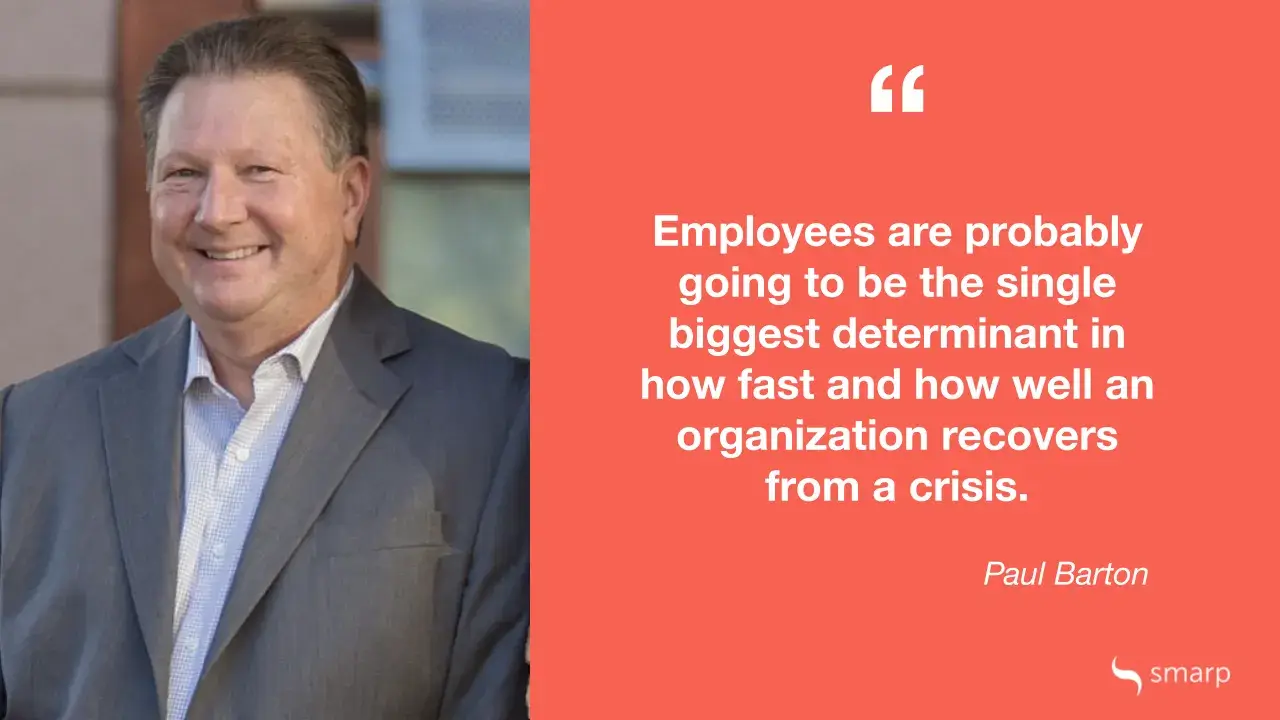
Remember that when it comes to crisis management, preparation is the key!
You’ll need to get your employees ready to face unexpected events, no matter how big the crisis is.
Build a Successful Crisis Communication Plan During the Coronavirus Outbreak with Haiilo
Communication is critical in crisis management. If you don’t effectively communicate with your employees during and after the crisis, you may cause more damage to the business.
When it comes to communication in the workplace, employees can’t afford to miss out on important information, especially in times of crisis.
How to successfully communicate with your employees during the coronavirus crisis
As explained earlier, poor internal communication encourages the spread of rumors and panic in the workplace.
What’s more, unprepared employees may accelerate the spread of misinformation outside the company through their posts and discussions on social media.
Even though preparing for crises is essential, many businesses are not ready yet.
The latest PwC’s global crisis survey shows that 41% of leaders are not able to gather appropriate information quickly. As a consequence, 40% are not able to make timely and deliberate decisions.
In times of crisis, businesses are facing two main challenges:
1. They don’t have a clear crisis communication strategy in place that allows top management and team leaders to effectively inform their employees.
2. They don’t have any way to make sure that employees have received and understand the messages shared with them.
One of the most common mistakes is to use multiple communication channels without coordinating the flow of information within the company.
As a result, some messages may be duplicated while others may be missing. Employees end up feeling confused and lost.

When it comes to crisis communication, you need to share the right information to the right employees through their favorite channels. And this is what Haiilo is made for.
We’ve surveyed our clients and asked them how they’re using the platform Haiilo to keep their businesses running smoothly during the COVID-19 crisis and compiled their best practices as below:
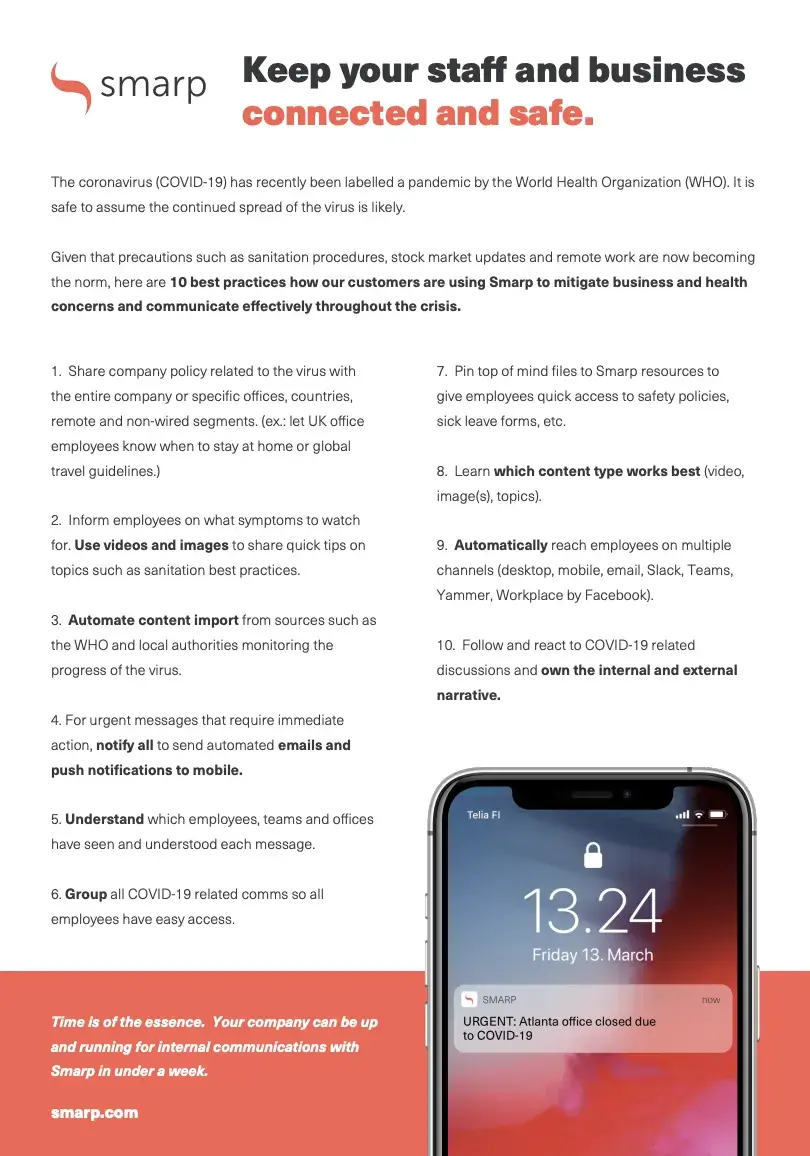
Essentially, Haiilo helps you to:
- Act fast. With Haiilo, you can immediately inform your employees through their favorite communication channels during the crisis.
- Avoid confusion and the spread of rumors during the coronavirus outbreak. Haiilo helps you manage your messages and communication materials in one place. That way, employees don’t need to look for the information by themselves, they get the information they need right away.
- Make sure that each team receives the right information about the COVID-19 pandemic. Haiilo helps you build a crisis communication plan that is relevant to each team. The platform helps line managers explain to their teams how the crisis impacts their projects.
- Start open discussions with your employees. Employees can react to the messages you share internally and ask questions about the crisis.
- Enhance employee productivity during the coronavirus outbreak. Because employees immediately receive the information they need to understand the situation, they can keep focused rather than reaching out to their colleagues to get information related to the crisis.
- Prevent the spread of anxiety during the crisis. Informed employees are less likely to panic during the crisis. They know the nature of the crisis, its origins, and how it may impact their jobs. Open communication is the secret sauce to keeping the situation under control!
- Protect the company’s image and reputation. People tend to more easily trust employees than CEOs. Your employees play a critical role in crisis management: they can either protect your brand or damage it. Haiilo helps you prepare your employees for crises.
- Measure the success of your crisis communication plan. Haiilo provides you with comprehensive analytics so you know whether your employees read and understand your messages.
- Recover from the coronavirus crisis. Communication is essential during but also after the crisis. Haiilo helps you communicate with your employees key facts on the crisis.That way, they can have a better understanding of the crisis overall and how their attitudes and behaviours helped during the recovery process. By enhancing an open communication after the crisis, Haiilo helps you sharing key learnings from the crisis with your employees. By encouraging open discussions, Haiilo also helps you rebuild trust in the workplace.




